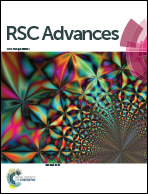Thymoquinone, a bioactive component of Nigella sativa Linn seeds or traditional spice, attenuates acute hepatic failure and blocks apoptosis via the MAPK signaling pathway in mice
Abstract
Thymoquinone (TQ), a bioactive natural product obtained from the black cumin seeds of Nigella sativa Linn, is a widely used spice or herb. The present study investigated the hepatoprotective effect of TQ on acute hepatic failure induced by D-galactosamine (D-GalN) and lipopolysaccharide (LPS) in mice. The mice were intragastrically administrated TQ (5 or 20 mg kg−1) for 12 h and 1 h prior to D-GalN (700 mg kg−1)/LPS (10 μg kg−1) injections and then sacrificed 8 h after treatment with D-GalN/LPS. TQ pretreatment reduced the mortality induced by D-GalN/LPS and reversed liver damage. TQ attenuated D-GalN/LPS-induced hepatocyte apoptosis, which was confirmed by suppressing caspase activation, PARP cleavage and the Bax/Bcl-2 ratio. Importantly, TQ attenuated the D-GalN/LPS-mediated phosphorylation of JNK, ERK and p38. Furthermore, TQ suppressed the production of proinflammatory cytokines. These findings suggested that TQ could modulate D-GalN/LPS-mediated acute hepatic failure by inhibiting caspase activation, consistent with the mitochondrial pathway of apoptosis and the MAPK signaling pathway.


 Please wait while we load your content...
Please wait while we load your content...